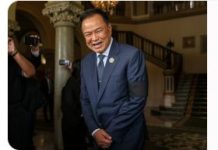UNITED NATIONS, Oct 12 (DNA):Describing India’s occupation of Jammu and Kashmir as the “worst manifestation of modern-day colonialism,” Pakistan on Tuesday called on the United Nations to actively promote a peaceful settlement of the Kashmir dispute in accordance with the Security Council resolutions and the wishes of the Kashmiri people.
Noting that since 1946, 80 former colonies have gained independence, Ambassador Munir Akram told the General Assembly’s Special Political and Decolonization (Fourth) Committee that there were still peoples who were denied the right to self-determination, “most prominently the people of occupied Jammu & Kashmir and Palestine”.
The right of self-determination of the Kashmiri people, the Pakistani envoy said, was explicitly recognized in the UN Security Council Resolution 47 and several subsequent resolutions, which prescribed that the final disposition of the State of Jammu & Kashmir should be decided by its people through a free and fair plebiscite held under the UN auspices.
These resolutions were accepted by both India and Pakistan, he said, adding that under Article 25 of the UN Charter, both parties were obliged to implement the resolutions.
After Pakistani envoy’s speech, delegates of India and Pakistan engaged in a verbal duel over the Kashmir dispute.
In his remarks, Ambassador Akram said for 70 plus years, through force and fraud, India had avoided the implementation of UN resolutions, and since 1989, it’s “brutal” campaign of repression killed 100,000 Kashmiris.
Since August 5, 2019, he said, India had taken “unilateral and illegal steps” to annex occupied Kashmir in what its leaders had termed a “final solution”.
“Kashmir today is the most densely occupied place in the world, with 900,000 Indian occupation troops deployed in a region the size of Belgium, with one Indian soldier for every 8 Kashmiri man, woman, and child,” Ambassador Akram said, pointing out that they had perpetrated a vicious campaign of extra-judicial killings in fake encounters; and “cordon and search” operations; abduction and enforced disappearances of 15,000 young Kashmiri boys; and collective punishments, destroying and burning entire villages and urban neighbourhoods.
“India has incarcerated the entire Kashmiri leadership since 2019. Several of these leaders have died in the Indian custody, including Altaf Ahmad Shah, who passed away yesterday,” he told the committee.
“This brutal campaign of oppression”, the Pakistan envoy said, “is turbo-charged by “Hindutva” ideology which asserts Hindus’s religious and ethnic supremacy and hate against Muslims and other minorities.” Genocide Watch warned that it could very well lead to genocide, he noted.
“A wall-of-silence has been imposed over IIOJK with a physical lockdowns, a total information blackout, and censorship and surveillance to suppress the voice of the Kashmiri people”, he said, highlighting that journalists, lawyers, and human rights defenders were routinely incarcerated, beaten, humiliated, harassed and even accused of “terrorism” for reporting on the human rights violations in the territory.
In a classic settler-colonial project, Ambassador Akram said India had initiated a process of demographic to convert Jammu and Kashmir from a Muslim majority state to a Hindu majority territory. Over 3.4 million fake domicile certificates had been issued to Hindus from all across India, as the land and properties of Kashmiris were also being confiscated for military and official use.
All the unilateral measures undertaken by India since August 5, 2019 were blatant violations of international law, including the relevant UN Security Council resolutions — not only illegal but, ipso facto, null and void, he said.
Pakistan, he said, desired peaceful relations with all its neighbours, including India, but to ensure durable peace in South Asia, the resolution of the Jammu & Kashmir dispute was essential.
“The onus is on India to create conditions for a dialogue to resolve the Jammu and Kashmir dispute,” Ambassador Akram said, adding to that end, India must: stop all human rights violations in the occupied Jammu and Kashmir; halt and reverse demographic change there; and restore Kashmir’s statehood and identity by reversing the illegal and unilateral measures imposed on and after August 5, 2019.
“The Security Council and the Secretary-General must actively promote a peaceful settlement of the Jammu and Kashmir dispute in accordance with the UN Security Council resolutions and the wishes of the Kashmiri people by fully utilizing the modalities provided for in Chapter VI of the UN Charter, including Articles 33, 34 and 99 of the Charter,” he added.
Reacting to Ambassador Akram’s statement, an Indian delegate, Nitish Birdi, repeated the allegation about Pakistan’s involvement in terrorism, and said that by raising the Kashmir issue, Pakistan had wasted the committee’s time.
Pakistan’s delegate Naeem Sabir hit back at India immediately, asserting that the continued Indian colonization of Kashmir was not a waste of time.

















